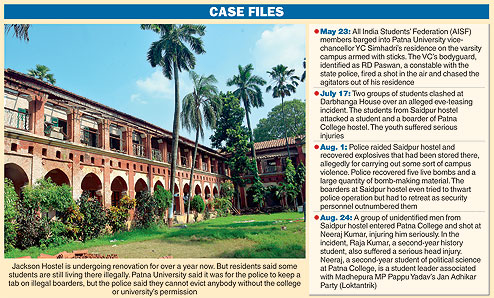
Old wine in new bottle, err... new policy.
Red, white and sparkling - all three wine varieties will be available at retail shops by this weekend.
The first consignment of wine - after implementation of the new excise policy - reached the state on Sunday. The Bihar State Beverage Corporation Limited will check the consignment, comprising around 400 cases (each case contains 12 bottles), before the bottles reach the retailers.
On December 24 last year, the state excise department issued a notification authorising the corporation to buy foreign-made foreign liquor (FMFL) from manufacturers, suppliers or importers and distribute it for retail purposes to the state's licensed foreign liquor shops. The notification allowed sale of 12 brands of FMFL, three brands of wine manufactured by Sula Vineyards, and Bermuda-headquartered company Bacardi's low-alcohol-content beverage Breezer through licensed liquor shops. The retail sale of Breezers in Patna started in the second week of January.
Sula is one of the leading wine manufacturers and suppliers in the country. Karan Gandhi, proprietor of Elite Marketing, exclusive promoter of wines manufactured by Sula in Bihar, claimed that wine is a low-alcohol lifestyle which is meant to be consumed with food.
"Wine could be the perfect answer for reducing consumption of liquor with high alcohol content such as whisky, rum and vodka. Wine comes with a background of low alcohol strength, good for heart and skin. It also inherits antioxidants, which lower bad cholesterol and boosts up the good ones as per the medical science. Wine has the lowest calories in comparison to all the alcoholic drinks," he added.
Wine promoters claimed that against the high alcoholic content of 42.8 per cent in spirits such as whisky and rum, the same in wine and champagne is in the range of around 5.5-15.5 per cent.
Karan, a wine connoisseur, claimed that the alcohol content in wines manufactured by Sula is in the range of 13.5 per cent by volume.
Health experts claimed that wine could bridge the gap between soft drinks and hard liquor. "Alcohol dehydrogenises enzymes, which fights liquor inside our body," said physician Diwakar Tejaswi. "(One) can digest 30ml of drinks having alcohol content measuring 47 per cent a day without leading to any health hazards. Thus, a 750ml bottle of wine having 13.5 per cent alcohol content cannot be termed harmful for the body with the condition that its consumption should be highly regulated. Excess consumption of alcohol leads to numerous health hazards, including liver cancer."
Most bars in Patna do not serve wine but not because there is not enough demand for it. "For youths who live in cities like Calcutta or Mumbai, wine is common," said Sumit Kheria, owner of Pind Balluchi restaurant. "When they come to Patna, they search for wine here as well."
Incoherent tax structure and price fixing for wine bottles have disrupted retail sale of wine in the state for long. Till 2009-10, a firm, Champagne Indage, used to distribute wine in the state but the company went bankrupt. Sunday's consignment will change the scenario again.
"The first consignment of Sula Satori Merlot Malbec (red), Sula Vineyard 2015 Chenin Blanc (white) and Methode Classique Sula Seco (sparkling) reached Patna on Sunday morning and they have been stocked at Sula Wine depot at Karmalichak," said Karan. "As per the norms, the entire stock would be sent to the beverage corporation depot, from where the supply would be made to retail stores. We expect that this process would take another three to four days. People can expect to see those in stores by Thursday or Friday."
As per market statistics, consumption of wine in India is comparatively much lower than hard liquors such as whisky and rum among others. "While whisky and beer consumption in India is around 700 million cases, that of wine is around only 2.5 million cases. Majority of wine consumption in the country is confined to bigger cities such as Mumbai, Delhi, Bangalore and Goa among others," said Karan.










